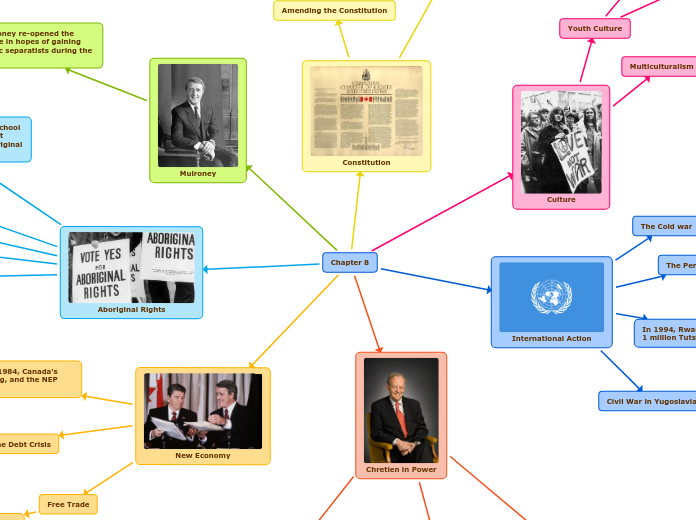a Li Katelyn 4 éve
261
Chapter 8

a Li Katelyn 4 éve
261

Még több ilyen
The UN intervened by sending forces, but ultimately failed to manage the situation
Since end of the Cold War, NATO's supposed function is to be an active peacekeeper that would resort to military force if needed
The Soviet leader, Gorbachev, proposed to the US for both superpowers to have massive arsenal cuts as a result of not being able to afford the arms race
The ethical dilemma of whether Canada should create trade relations with countries that have poor human rights track records.
The possibility of making businesses richer at the cost of most workers.
The FTA was expanded to Mexico
Critics of Free Trade argued:
A potential threat for our independence. Economic union means there's increased pressure for political union.
Canadian business can't compete with large US businesses
US branch plants will go to Canada to avoid tariffs, therefore causing jobs to be lost
Supporters of Free trade argued the benefits of it, which includes:
US firms would go to Canada for its natural resources, skilled workers and decent transportation system
Give access to the US market and increase Canada's productivity, therefore our products can be sold at lower prices
Free trade leading to more US investment and therefore improve the overall economy
Mulroney used this approach
Unemployment exceeds 50%; 60% for those who did not attend highschool
Life expectancy for First Nations is lower than Canadians. For men, it's 7.4 years, for women, its 5.2.
1/4 First Nations children live in poverty compared to 1/6 Canadian children
By 2015, an agreement was reached but not ratified
The crisis was resolved when the disputed land was bought by the federal government, and given to Kanesatake, a nearby reserve
Those who were displeased include:
Manitoba and Newfoundland, who did not support the proposal
Critics who were concerned about the "Distinct society" clause, which would give Quebec the power to re-write the Charter and take away the rights of certain groups
Pierre Trudeau, who claimed that having Quebec as a distinct society would only further alienate them
Aboriginal peoples, who believed they also had a distinct society and wish to be recognized
The Meech Lake Accord was rejected in 1990
Its rejection increased Quebec separatism, and Lucien Bouchard formed a national party called the Bloc Quebecois
Following its rejection, the Prime Minister Mulroney arranged the "Citizens' Forum" and then proposed the Charlotte Town Accord, which was another set of constitutional amendments
Canadians voted through a national referendum
54.3% of Canadians voted "no". Most of the opposition came from British Columbia
The 1995 Quebec Referendum was held as a result of frustration from the constitution debates
49.4% voted "yes"
The federal government passed the Charity Act, which declared that Ottawa would be the one to decide what a considerable majority would be
Separatism in Quebec died down by the end of the century
Its provisions include giving provinces more power, and acknowledging Quebec as a separate society
Obstacles in patriating the Constitution include:
The various meetings held failed to settle concerns that split the provincial and federal government
Levesque fearing that the Charter could provide the opportunity for language laws to be rewritten
Most provincial premiers believing that the Charter would make courts more powerful than provincial legislatures
An agreement on the Amending Formula was settled on the last night of the Ottawa constitutional conference: 7/10 provinces will represent 50% of Canada
The constitution was patriated without Quebec's agreement
Additionally, the Charter was accepted by the provinces under the basis that the notwithstanding clause were added
The notwithstanding clause allows Parliament, or provincial legislatures to enable an Act, even if it it doesn't follow the Charter
The majority of Quebecois voted "no"
Links that would've been kept between Canada and Quebec under sovereignty-association include:
Common tariffs on imported goods
Common currency
Free trade